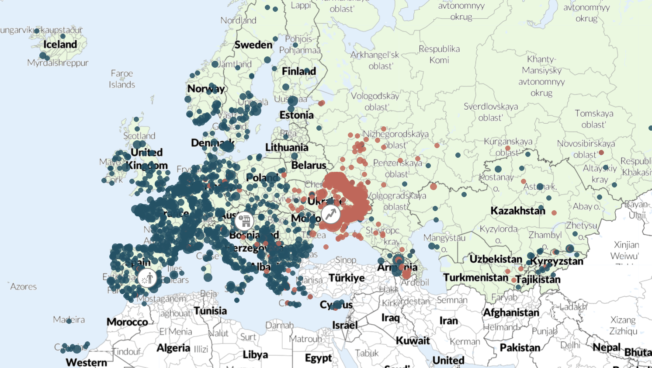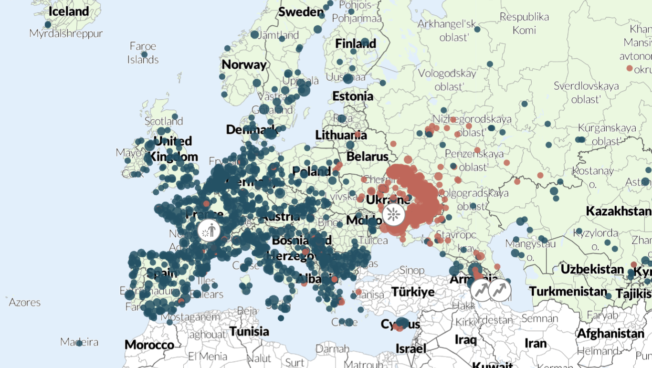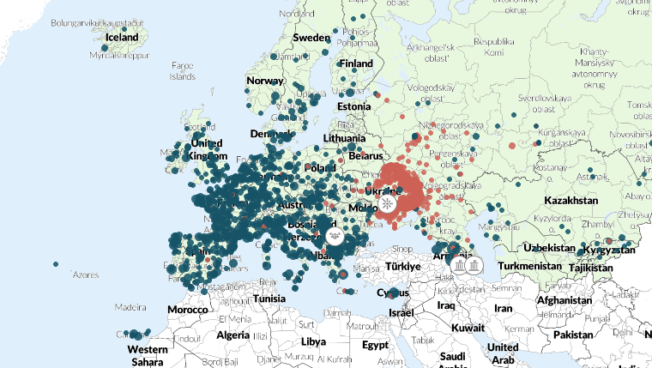Regional Overview
Europe, Caucasus and Central Asia
November 2024
Posted: 9 December 2024
In this Regional Overview
- France: Farmers resume protests over EU-Mercosur trade deal
- Georgia: Post-election crisis persists; Abkhazia leader ousted
- Netherlands: Israeli football fans and Dutch Arabs clash in Amsterdam
- Serbia: Deadly roof collapse at a train station sparks massive countrywide protests
- Ukraine-Russia: Long-range strikes escalate
France: Farmers resume protests over EU-Mercosur trade deal
Triggered by the potential signing of the contentious trade deal between the European Union and several South American countries in the Mercosur bloc,1Guillaume Le Du, ‘Les syndicats d’agriculteurs appellent à la mobilisation le 15 novembre,’ Ouest-France, 21 October 2024; Reuters, ‘France says EU Commission to end trade deal talks with Mercosur countries,’ 29 January 2024 farmers across France resumed protests in November. Led by the National Federation of Farmers’ Unions (FNSEA) and the Young Farmers (JA), the movement quickly gained momentum, rallying other unions — notably the Rural Coordination (CR) — to voice deep-seated grievances and demand that the Barnier government fulfill agricultural promises made by its predecessors in early 2024.2La France Agricole, ‘Gabriel Attal annonce neuf nouvelles mesures d’aide pour l’agriculture,’ 27 April 2024 ACLED records over 230 farmer-related protests in France in November — more than seven times the monthly average since coverage of France began in 2020 and the second-highest monthly total after the previous peak of farmer demonstrations in January 2024.
Unlike those protests, which were dominated by convoys and roadblocks, recent demonstrations have appeared more focused and localized following the announcement of a tougher police response.3Le Monde, ‘Agriculteurs : en cas de « blocage durable, ce sera tolérance zéro », prévient Bruno Retailleau,’ 17 November 2024 Actions have included bonfires, blockades of supermarket logistics hubs, and the dumping of farm waste outside state buildings. While largely peaceful, notable incidents have included the looting of a truck carrying Spanish goods; vandalism of a farming insurance fund building in Nimes, Occitanie region; and symbolic acts such as bricking up building entrances that have targeted environmental regulators and associations, despite recent relaxation of environmental norms for farmers at the European level.4Le Monde, ‘Des associations écologistes dénoncent des violences « intolérables » d’agriculteurs et annoncent porter plainte,’ 28 November 2024; Bartosz Brzezinski and Paula Andrés, ‘Rushed rollback of EU green farming rules triggers dismay,’ Politico, 23 April 2024 Although the government reaffirmed its opposition to the current EU-Mercosur trade deal and parliament unanimously voted against the agreement,5P.B., ‘Mercosur: le Sénat soutient à son tour le gouvernement contre le traité de libre-échange,’ BFMTV, 27 November 2024 the FNSEA, JA, CR, and other farming unions have called for fresh demonstrations in early December, citing unresolved grievances.6TFI Info, ‘Agriculteurs en colère : vers de nouvelles mobilisations les 9 et 10 décembre,’ 29 November 2024 Polish farmers also began protests and blocked a border crossing with Ukraine, voicing opposition to the EU-Mercosur deal.
Georgia: Post-election crisis persists; Abkhazia leader ousted
The standoff between the ruling Georgian Dream (GD) party and the opposition deepened in November. The latter refused to take up seats in parliament while small-scale demonstrations against alleged election fraud continued throughout the month. On 19 November, police dispersed an encampment in the area of Tbilisi State University. On 25 November, amid demonstrations and tightened security, GD members of parliament single-handedly inaugurated the new parliament. With the opposition boycotting subsequent sessions as well, they confirmed a GD-led government. On 28 November, the European Parliament called for a re-run of parliamentary elections in Georgia and the sanctioning of its top officials.7European Parliament News, ‘Parliament calls for new elections in Georgia,’ 28 November 2024 Shortly afterward, Georgia’s Prime Minister, Irakli Kobakhize, announced the suspension of accession talks with the EU for the remainder of GD’s fourth term in office until the end of 2028 and the rejection of EU aid. Both have been on hold since adopting a foreign agent law in May. The announcement triggered demonstrations in the capital, Tbilisi, and other cities across Georgia, which riot police dispersed with water cannons and riot-control chemicals. It appears police also deliberately beat up journalists covering the events.8Civil Georgia, ‘Watchdog: Police Target Journalists, Many Injured,’ 29 November 2024 The number of demonstrators and detentions grew by the day. Demonstrators erected barricades in the city center, set fires, and launched fireworks toward police concentrated around parliament. The United States suspended a strategic partnership with Georgia9Matthew Miller, ‘Statement on Georgia’s Suspension of European Union Accession,’ U.S. Department of State, 30 November 2024 while multiple civil servants and diplomats announced resignations.10Paul Kirby, ‘Georgia’s PM hits back as protests and resignations intensify,’ BBC, 2 December 2024 Outgoing President Salome Zourabichvili warned she would not hand over to a GD-appointed successor on 29 December.11President of Georgia, ‘President’s Address to the Nation,’ 30 November 2024
For more information, see ACLED’s Election Watch report, Georgia: An “existential” election.
Meanwhile, an attempt to grant privileges to Russian businesses12Civil Georgia, ‘Protests Erupt in Sokhumi Over Fears of Russian Encroachment,’ 15 November 2024 backfired in Abkhazia, the Black Sea coast region of about 240,000 people that seceded from Georgia in the early 1990s.13BBC, ‘Abkhazia profile,’ accessed on 26 November 2024 It is a client of Russia, which maintains a military base in the region14Natia Seskuria, ‘Is Russia Expanding its Battlefront to Georgia?’ Royal United Services institute, 23 October 2023 and funds about half of the local budget.15Interfax, ‘Five billion roubles of Russian aid earmarked in the Abkhaz budget for 2025,’ 30 October 2024 After signing an investment agreement with the Russian government,16Radio Free Europe/Radio Liberty – Echo of the Caucasus, ‘Abkhazia and Russia sign an agreement rejected by the Abkhaz opposition,’ 30 October 2024 Abkhazia’s authorities encountered popular resistance while attempting to ratify it. On the eve of the vote, police detained five opposition activists but released them shortly after demonstrators blocked three bridges leading to the region’s capital, Sukhumi. On 15 November, crowds gathered in Sukhumi, initially demanding the scrapping of the ratification bill and — after clashing with police and occupying the government quarter — the resignation of Abkhazia’s President, Aslan Bzhania. With his term expiring in early 2025, Bzhania eventually stepped down. He is the third Abkhaz leader who has been toppled in a popular uprising in the past 10 years.17Inal Khashig, ‘Op-ed: Another coup, another president ousted – how can Abkhazia break the cycle?’ Jam News, 19 November 2024
Netherlands: Israeli football fans and Dutch Arabs clash in Amsterdam
Clashes involving Israeli football supporters and members of the Dutch Arab community occurred on the eve of and after an Ajax-Maccabi Tel Aviv match on 7 November in Amsterdam. Israeli fans chanted anti-Arab slurs, tore down and burnt Palestinian flags around the city, pelted stones, and assaulted a taxi driver, damaging his vehicle. Local authorities proscribed a pro-Palestine demonstration in the vicinity of the stadium on 7 November on security grounds. However, some pro-Palestine activists still approached the area and clashed with police. Egged on by calls to violence on messaging apps overnight, mobs chased and assaulted Israelis returning from the match across the city. Five injured Israelis were hospitalized. Police arrested 62 people, including 10 Israelis.18Gemeente Amsterdam, ‘Raadsbrief feitenrelaas geweldsincidenten,’ 11 November 2024 Amsterdam authorities temporarily banned or relocated further pro-Palestine demonstrations in the city, which nonetheless proceeded between 11 and 13 November and resulted in clashes with police, a tram set ablaze, and multiple arrests. An investigation is ongoing into alleged police brutality during one of the dispersals.19Tamsin Paternoster, ‘Dutch police under investigation for alleged violence against protesters in Amsterdam,’ Euronews, 14 November 2024 Sports events involving Israeli teams have been previously canceled in Belgium and Bosnia and Herzegovina due to security concerns in the wake of Israel’s offensives in Gaza and Lebanon.20UEFA, ‘Friendly match Bosnia and Herzegovina vs Israel cancelled,’ 22 March 2024; BBC, ‘Belgium will not host Israel game over security fears,’ 16 July 2024 A match between the French and Israeli national football teams in Paris on 14 November went ahead amid significant police presence. A match between Turkish and Israeli football clubs on 28 November was relocated from Turkey to Hungary and held without spectators.21Justin Spike, ‘Israeli soccer team prepares for closed-door match in Hungary after attacks on fans in Amsterdam,’ The Associated Press, 27 November 2024
Serbia: Deadly roof collapse at a train station sparks massive countrywide protests
The collapse of a concrete canopy at a recently renovated train station in Novi Sad on 1 November, which killed 15 people, sparked widespread protests across Serbia. On 22 November, protests occurred in at least 50 cities, where citizens occupied the streets for 15 minutes to honor the victims and demand accountability for their deaths. This marked the most demonstrations on a single day since ACLED began recording data for Serbia in 2018. Throughout November, some demonstrations turned violent, particularly in Novi Sad and the capital, Belgrade, where clashes erupted among demonstrators, police, and counter-demonstrators, some of whom were later identified as officials from the ruling Serbian Progressive Party (SNS) party. In some cases, police responded with tear gas, pushbacks, and detentions. Demonstrators and unknown perpetrators vandalized SNS offices in Novi Sad and Kragujevac and splattered red paint on SNS offices in several locations. Finally, on 25 November, tensions between the opposition and SNS members escalated into a physical confrontation during a National Assembly session after a motion of no confidence was rejected. Two ministers in the SNS government resigned over the tragedy, and one has been remanded in an investigation along with 12 others.22BBC Serbian Service, ‘Tragedija u Novom Sadu: Goranu Vesiću ukinut pritvor, uhapšeno trinaest osumnjičenih,’ 21 November 2024
Ukraine-Russia: Long-range strikes escalate
On 19 and 20 November, Ukrainian forces struck a Russian ammunition dump in the Bryansk region and a command and control point in the Kursk region with long-range missiles, killing and wounding several high-ranking Russian and North Korean military personnel at the latter location. The US previously limited the use of ATACMS and SCALP/Storm Shadow missiles to Ukrainian territory only. On 21 November, having amended its nuclear doctrine to now allow a nuclear response to attacks with conventional weapons,23The Associated Press, ‘Putin lowers the threshold for using his nuclear arsenal after Biden’s arms decision for Ukraine,’ 19 November 2024 Russia fired an intermediate-range ballistic missile at a missile plant in Dnipro city. It was the first use of such a missile in an armed conflict, though it is believed to have carried no charge.24Tom Balmforth and Gerry Doyle, ‘New Russian missile fired at Ukraine carried warheads without explosives, sources say,’ Reuters, 26 November 2024 Russia’s President Vladimir Putin subsequently accused Ukraine’s backers of escalating the war and threatened further strikes against Ukraine and its backers.25Meduza, ‘“We are prepared for any turn of events’ In a televised speech, Vladimir Putin claims a hypersonic missile attack on Ukraine and warns the West of more to come — Full transcript,’ 21 November 2024 He also blamed the US for unraveling missile control, tying it to talks on a ceasefire in Ukraine.26Maxim Starchak, ‘Russia’s Hypersonic Missile Attack on Ukraine Was an Attempt at Blackmail,’ Carnegie Endowment for Democracy, 29 November 2024
Earlier, on 17 November, Russia resumed large-scale drone and missile strikes on Ukraine’s energy infrastructure. The previous nine waves of Russian attacks between March and August deprived Ukraine of 80% of its thermal power generation capacity. The country now relies on three nuclear power plants and electricity imports. Another wave of strikes occurred on 28 November. On both occasions, Russia used close to a hundred missiles accompanied by a similar number of drones, targeting energy infrastructure in central and western Ukraine and inducing emergency shutdowns and blackouts amid near-freezing temperatures.
On the battlefield, Ukraine has been losing ground in and around Kurakhove in the Donetsk region. Russian forces also started assaulting the Ukrainian stronghold of Velyka Novosilka near the boundaries of Donetsk, Dnipropetrovsk, and Zaporizhia regions. Heavy fighting continued in and near Toretsk and Chasiv Yar. In the Kharkiv region, Russian forces briefly broke into the eastern part of Kupiansk on the left bank of the Oskil River, which they appear to have crossed upstream in the area of Dvorichna. Russian forces further reduced the Ukrainian foothold in the Kursk region around Sudzha.
For more information, see the ACLED Ukraine Conflict Monitor.
See More
See the Codebook and the User Guide for an overview of ACLED’s core methodology. For additional documentation, check the Knowledge Base. Region-specific methodology briefs can be accessed below.
Links:
For additional resources and in-depth updates on the conflict in Ukraine, check our dedicated Ukraine Confict Monitor.







